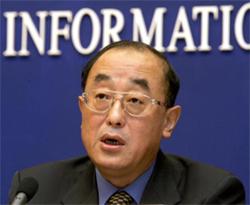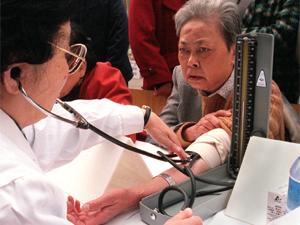A woman eagerly awaits the results of a blood pressure check courtesy of the Chinese Ministry of Public Health and the World Health Organization’s Beijing representative. The event is designed to promote better health awareness among the young and old alike, especially those with no formal health coverage. (AFP)
During the 2006 National Health Workers Conference, Gao Qiang, China’s Minister of Health, admitted that the cost of medical treatment was rising because some medical institutions constantly expand their facilities to increase economic returns. This phenomenon has made it difficult for the public to obtain medical care. There were also instances where hospitals would not accept a patient who was gravely ill because they couldn’t afford to pay.
A report from Chinese Scientists Discussion Forum in Beijing entitled “The Challenge to the Current Chinese Public Health System” pointed out that the unfair distribution of Chinese medical resources could be categorized in two broad issues.
One is the difference between urban and rural areas. Thirty percent of the population lives in urban areas, which consumes up to 80 percent of the public health resources. However, the rural areas, with 70 percent of the total population, receive only 20 percent of the total public health resources.
The other issue is the uneven distribution of health insurance. Only 15 percent of the population has health insurance. In China, even those who can afford to pay medical expenses are crammed into one hospital room with at least ten other patients. However, the hospital rooms used for high-level officials are equipped with air conditioning, refrigerators, televisions, etc.

